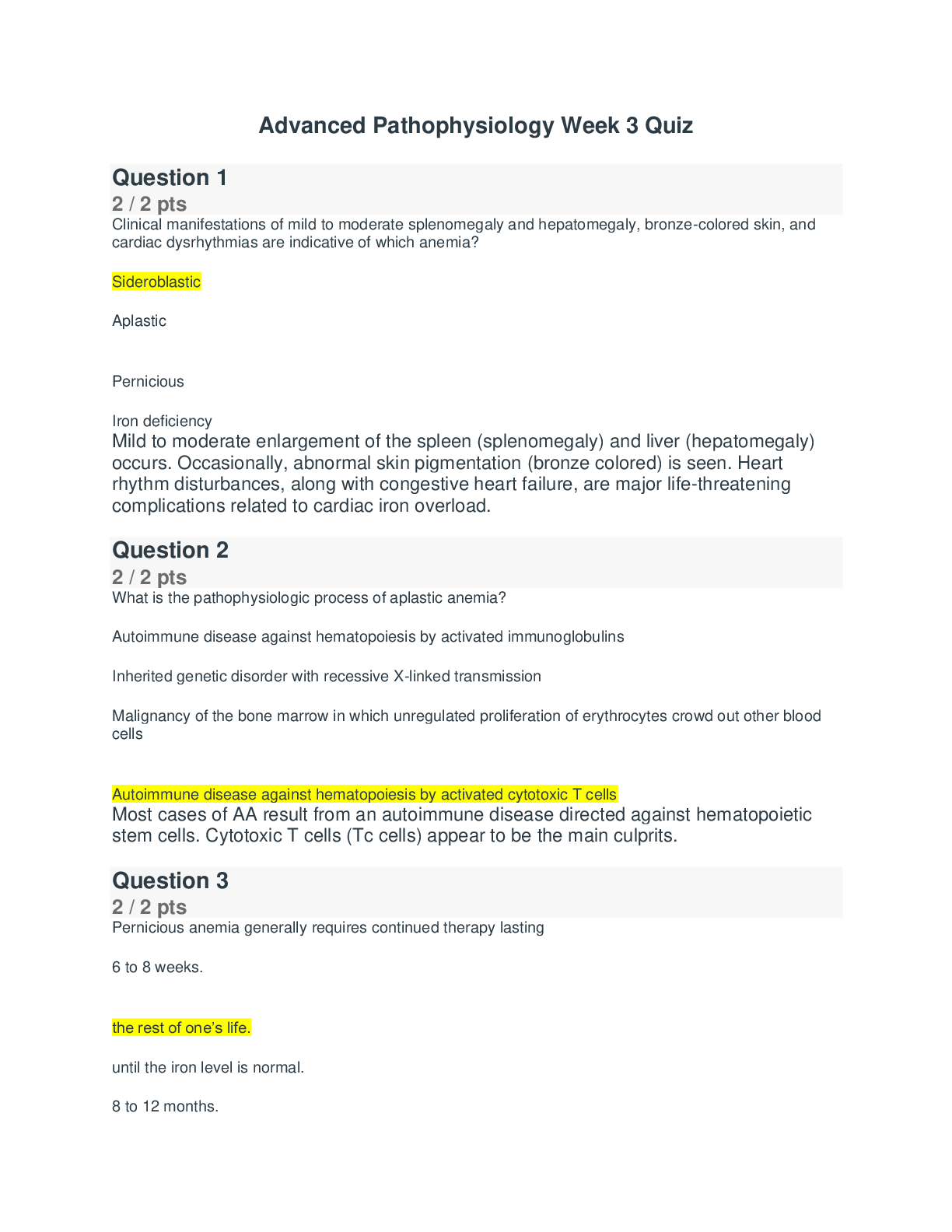NR 507 Week 3 Quiz 1:Advanced Pathophysiology
Document Content and Description Below
NR 507 Week 3 Quiz 1:Advanced Pathophysiology Question 1 2 / 2 pts Clinical manifestations of mild to moderate splenomegaly and hepatomegaly, bronze-colored skin, and cardiac dysrhythmias are indic... ative of which anemia? Sideroblastic Aplastic You Answered Pernicious Iron deficiency Mild to moderate enlargement of the spleen (splenomegaly) and liver (hepatomegaly) occurs. Occasionally, abnormal skin pigmentation (bronze colored) is seen. Heart rhythm disturbances, along with congestive heart failure, are major life-threatening complications related to cardiac iron overload. Question 2 2 / 2 pts What is the pathophysiologic process of aplastic anemia? Autoimmune disease against hematopoiesis by activated immunoglobulins Inherited genetic disorder with recessive X-linked transmission Malignancy of the bone marrow in which unregulated proliferation of erythrocytes crowd out other blood cells Correct! Autoimmune disease against hematopoiesis by activated cytotoxic T cells Most cases of AA result from an autoimmune disease directed against hematopoietic stem cells. Cytotoxic T cells (Tc cells) appear to be the main culprits. Question 3 2 / 2 pts Pernicious anemia generally requires continued therapy lasting 6 to 8 weeks. Correct! the rest of one’s life. until the iron level is normal. 8 to 12 months. PA cannot be cured, so maintenance therapy is lifelong. Question 4 2 / 2 pts Symptoms of polycythemia vera are mainly the result of destruction of erythrocytes. Correct! increased blood viscosity. neurologic involvement. a decreased erythrocyte count. As the disease progresses many of the symptoms are related to the increased blood cellularity and viscosity. Question 5 2 / 2 pts The body compensates for anemia by capillary vasoconstriction. kidneys release more erythropoietin. hemoglobin holds on to oxygen more firmly. Correct! increasing rate and depth of breathing. Tissue hypoxia creates additional demands and compensatory actions on the pulmonary and hematologic systems. The rate and depth of breathing increase in an attempt to increase the availability of oxygen. Question 6 2 / 2 pts In hemolytic anemia, jaundice occurs only when the patient has elevations in aspartate transaminase (AST) and alanine transaminase (ALT). Correct! heme destruction exceeds the liver’s ability to conjugate and excrete bilirubin. erythrocytes are destroyed in the spleen. the erythrocytes are coated with an immunoglobulin. Jaundice (icterus) is present when heme destruction exceeds the liver’s ability to conjugate and excrete bilirubin. ........continued.... [Show More]
Last updated: 2 years ago
Preview 1 out of 9 pages

Buy this document to get the full access instantly
Instant Download Access after purchase
Buy NowInstant download
We Accept:

Also available in bundle (1)

NR 507 Week 1-Week 7 Quizzes and Answers
NR 507 Week 1-Week 7 Quizzes and Answers
By YourTutor 4 years ago
$45.5
11
Reviews( 0 )
$12.00
Can't find what you want? Try our AI powered Search
Document information
Connected school, study & course
About the document
Uploaded On
Feb 13, 2021
Number of pages
9
Written in
Additional information
This document has been written for:
Uploaded
Feb 13, 2021
Downloads
0
Views
72


























